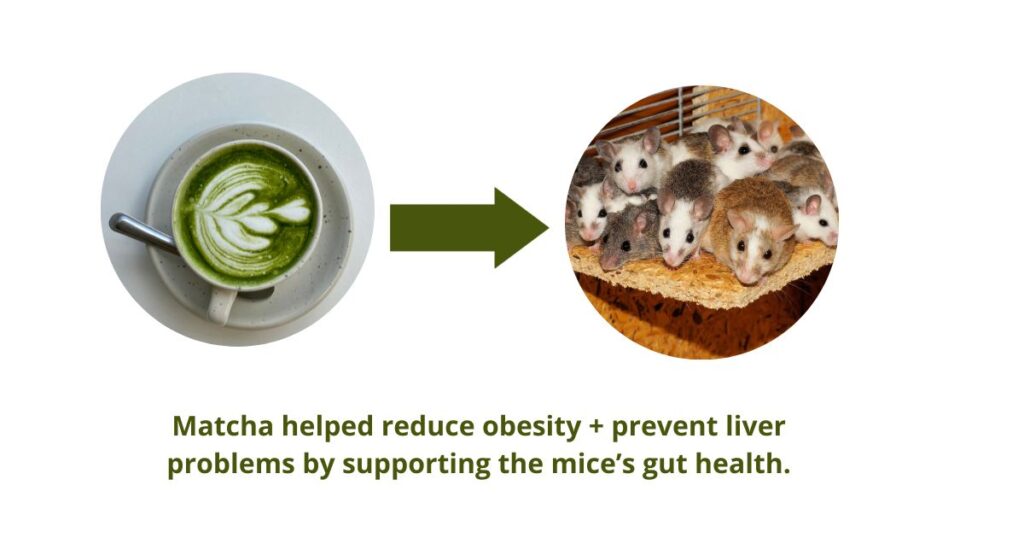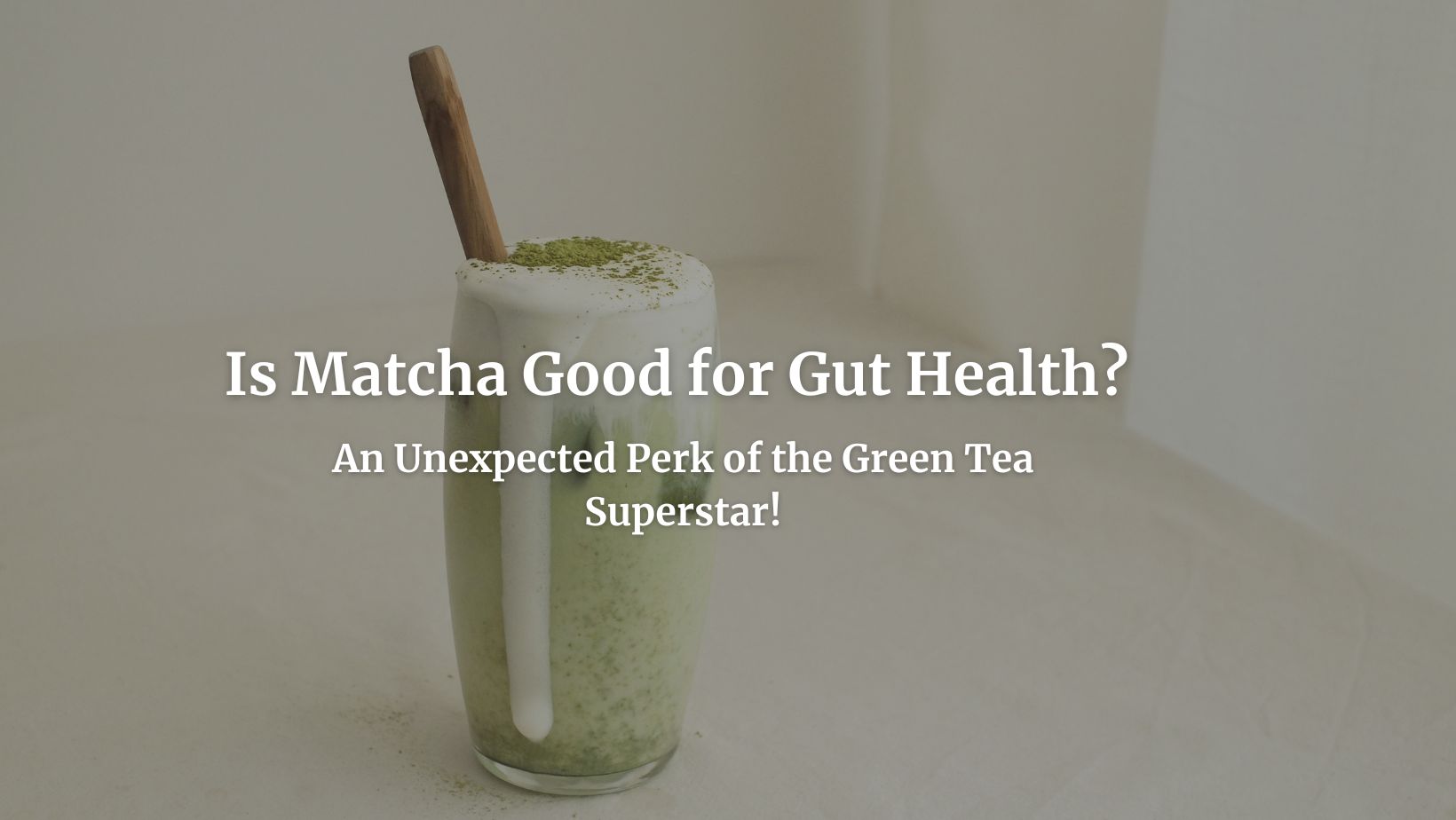Is Matcha Good for Gut Health? An MD Answers (… It’s Yes!)
Looking to boost your good gut bacteria? Matcha may be able to help – and, in this article we’ll answer is matcha good for gut health & why.
Gut health is a topic that’s been gaining tons of attention lately, and for good reason. A healthy gut is obviously essential for optimal digestion and nutrient absorption – but it even plays a part in mental well-being and preventing disease.
Matcha, a type of powdered green tea that has been a cornerstone of Japanese culture for centuries, is also enjoying a popularity surge. Rich in nutrients, chlorophyll, and L-theanine, it boasts an impressive amount of potential benefits. And, yes, gut health may be one of them.
In this article, I’ll be leaning on scientific evidence of matcha and gut health. I recently did an article on how to restore gut health after alcohol and it’s been doing pretty well – so, I thought I’ll go back to the topic with today’s piece. But, before we get started, yes, I’m a doctor but I’m not your doctor. For personalized health advice, go to your physician – this article is for informational purposes only.
So, grab a cup of matcha if you have one, and let’s get started!
What You’ll Learn:
- Is Matcha Good for Gut Health?: A science-backed answer to the big question.
- The Science Behind Matcha and Gut Health: What research says about matcha’s impact on your gut.
- How to Enjoy Matcha: Tips and tricks for incorporating this green wonder into your diet, plus a video guide.
- Other Health Benefits of Matcha: A look at what else matcha can do for you (spoiler alert” there’s quite a bit)
Want a clickable navigation? You’ve got it:
Table of Contents
Is Matcha Good for Gut Health?
Quick answer: most probably, yes, it is. Studies suggest gut health benefits from matcha and there’s actually an ongoing trial to test them, too.
A Closer Look at a Recent Study
In a recent paper published in Frontiers in Nutrition researchers explored the effects of matcha green tea on gut-liver axis homeostasis in mice that were fed a high-fat diet. The study found that matcha green tea had a positive impact on obesity, lipid accumulation, and hepatic steatosis, largely through its influence on the gut microbiome and metabolic pathways in the liver.
In simpler words, matcha’s disease-preventing benefits came from gut health perks + liver benefits. I did a little graphic to illustrate it 🙂


It may be a little silly but it’s true. Still, let’s dive in a little deeper:
Key Findings
Looking into the study a bit deeper, here’s what the scientists found:
- Less Obesity: The study found that matcha green tea reduced the development of obesity in mice fed a high-fat diet.
- Lipid Accumulation: Matcha also reduced lipid accumulation (how much fat the mice stored), which is a significant factor in obesity and metabolic disorders.
- Hepatic Steatosis: The study showed that matcha improved liver health by reducing hepatic steatosis or fatty liver.
- Gut Microbiome: Matcha restored alterations in the fecal bile acid profile and gut microbial composition. These changes indicate a healthier gut environment for the mice who received matcha.
- Metabolic Pathways: Finally, the study found that matcha had a regulatory effect on multiple metabolic pathways in the liver, particularly those involved in glucose, lipid, and bile acid metabolism. This explains how it managed to slow down disease processes even on a high-fat diet.
Implications for Gut Health
The study’s findings suggest that matcha green tea can support you in avoiding obesity and related metabolic disorders. One of the key mechanisms through which matcha exerts these benefits is by influencing the gut-liver axis. This is particularly interesting because the gut microbiome plays a crucial role in our overall health, including our metabolism and immune system. And, yes, it also means matcha supported gut health.
The Up-And-Coming Trial
There is additional research on matcha and gut health in the works. While animal studies are helpful, humans aren’t giant mice. In a study protocol published in the Journal of Clinical Biochemistry and Nutrition Japanese scientists describe how they’ll study the effects on matcha.
The study will healthy adults who will consume two types of matcha tea for four weeks. The researchers then will compare the participants’ gut microbiota before and after the study period. This is still an ongoing trial with unpublished results but once we have them, we’ll have one more piece of information on matcha and gut health.
Ultimately, right now we mostly have preliminary evidence – but, considering matcha’s safety & large potential benefits (not just for gut health), I believe it’s a great addition to your wellness routine.
How to Enjoy Matcha: Making It a Part of Your Wellness Routine
Now that we covered the science, let’s take a bit of a tastier detour and explore some delicious and healthful ways to enjoy matcha.
Selecting Quality Matcha
First things first, not all matcha is created equal. When shopping for matcha, look for high-quality, organic options. The brighter the green, the better the quality. Also, consider the source; matcha from Japan is generally considered to be of superior quality.
Ways to Incorporate Matcha
- Matcha Latte: A classic and easy way to enjoy matcha. Simply whisk matcha powder with hot water and add your choice of milk.
- Smoothies: Add a teaspoon of matcha to your morning smoothie for an antioxidant boost.
- Cooking: Believe it or not, matcha can be used in cooking too. It can add a unique flavor and color to dishes like pancakes, muffins, and even pasta.
- Straight Up: For the purists, matcha can be enjoyed just with hot water, whisked into a frothy delight.
Want more inspiration? Check out this great video covering ways to enjoy matcha and an amazing recipe for matcha latte:
Dosage and Precautions
While matcha is generally safe for most people, it does contain caffeine. Unlike regular coffee that can lead to energy spikes and crashes, matcha releases caffeine slowly, providing a more steady and sustained energy boost. Still, if you’re sensitive to caffeine or have certain medical conditions, it’s always a good idea to consult with a healthcare provider before making it a regular part of your diet.
Other Health Benefits of Matcha: More Than Just a Gut-Health Ally
We covered about matcha’s potential benefits for gut health and how to incorporate it into your diet. But this green powerhouse offers a plethora of other health advantages – in fact, it’s better known for them. I might do additional articles on this in the future, but it feels wrong to skip them here, too. So, here’s a quick recap of everything else matcha brings to the table:
Antioxidant Properties
Matcha is rich in polyphenols, flavonoids, and vitamin C, which are natural antioxidants. Even better, it also has a large antioxidant potential (meaning it can neutralise a relatively high amount of free radicals). As an antioxidant, matcha helps you combat oxidative stress, which could reduce the risk of chronic diseases such as cancer and heart disease.
Cognitive Function
Matcha contains a unique amino acid called L-theanine, which promotes relaxation and alertness. Combined with caffeine, it can improve cognitive function and enhance focus without the jitters commonly associated with other caffeinated beverages. In fact, studies show matcha can reduce stress and anxiety, rather than enhancing them like caffeine can. It’s also associated with a boost in memory, both short and long-term.
Anti-Aging Effects
In Japanese and Korean culture, matcha is often associated with anti-aging benefits. While researching this directly is a little more difficult than looking at cognitive function, for example, matcha’s antioxidant effects can protect you from a major factor of aging – free radicals. So, if you want that glowing, youthful skin for longer, your daily cup of matcha tea might prove a powerful ally.
Cardiovascular Health
Green tea in general has some interesting heart health benefits. By fighting oxidative stress, matcha may provide additional cardiovascular perks. Plus, we saw how it protected the mice in the study discussed above. Still, it’s early days to recommend matcha for heart disease prevention – in fact, if you’re already struggling with a cardiovascular condition, talk to your doctor if a caffeinated beverage like matcha is right for you.
Weight Management
Once again going to the mouse study, matcha can help in reducing obesity and improving metabolic health. But, we also have some evidence in humans – this recent review concluded 500mg of green tea as a supplement to diet and exercise can help you reduce your BMI to a healthy level.
What’s the Takeaway?
The science is compelling, albeit still emerging. What we do know is that matcha isn’t just a fad; it’s a nutrient-packed powerhouse with a history that spans centuries. And, yes, the answer to is matcha good for gut health seems to be yes.
The evidence suggests that matcha could be a valuable ally for your gut, especially when it comes to metabolic health and obesity prevention. It’s not just about the gut, though. Matcha is a multitasker, offering cognitive, cardiovascular, and even potential anti-aging benefits.
If you’re keen to make matcha a part of your wellness journey, remember that quality matters. Opt for bright, organic matcha from reputable sources. Whether you whisk it into a latte or blend it into a smoothie, the options are as versatile as the benefits.
As always, while matcha is generally safe, it’s wise to consult your healthcare provider if you have specific health concerns or sensitivities, particularly to caffeine.
So, why not make your next cup of wellness a matcha one? After all, it’s not just a drink; it’s a lifestyle choice backed by both tradition and science. Cheers to a healthier you!







